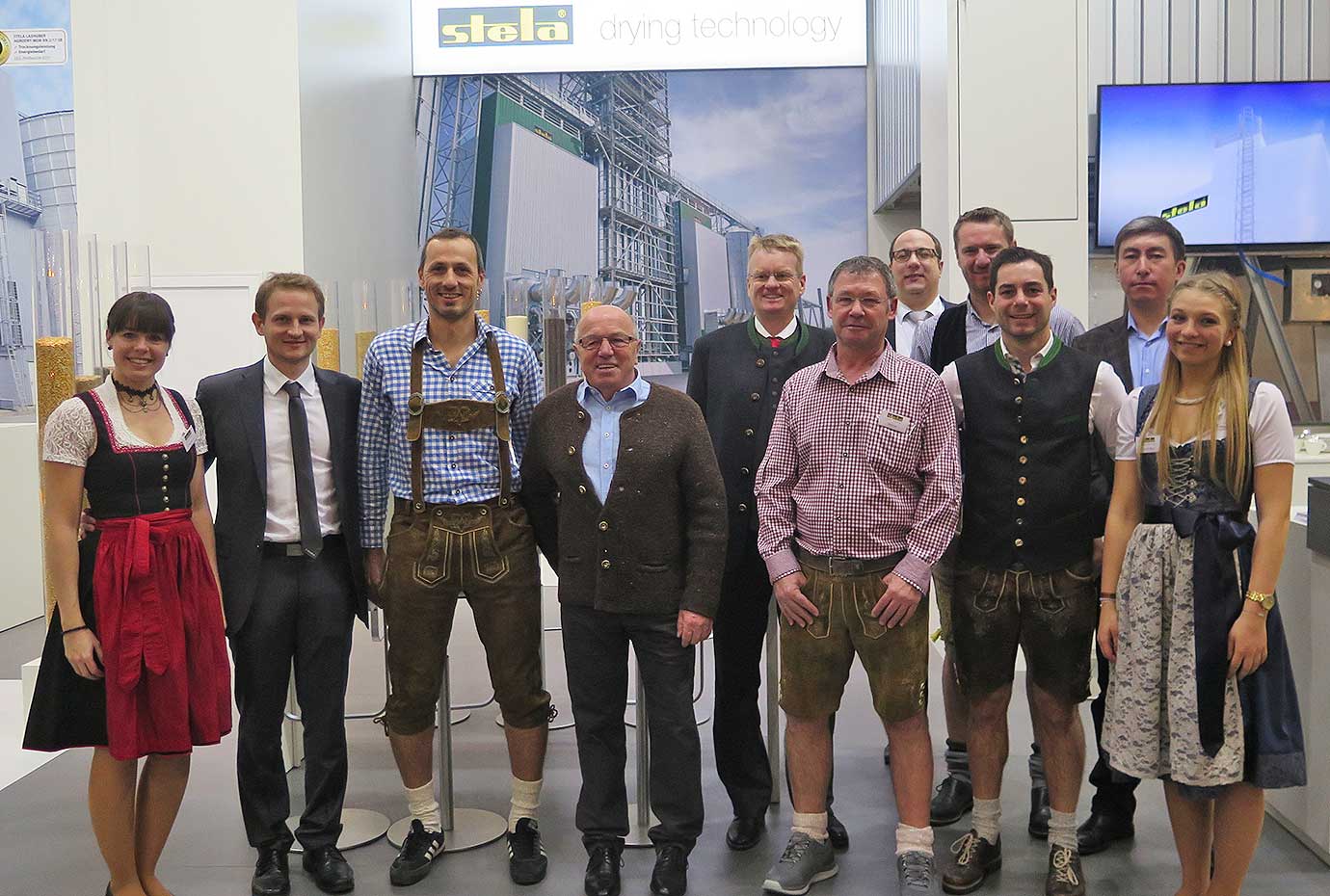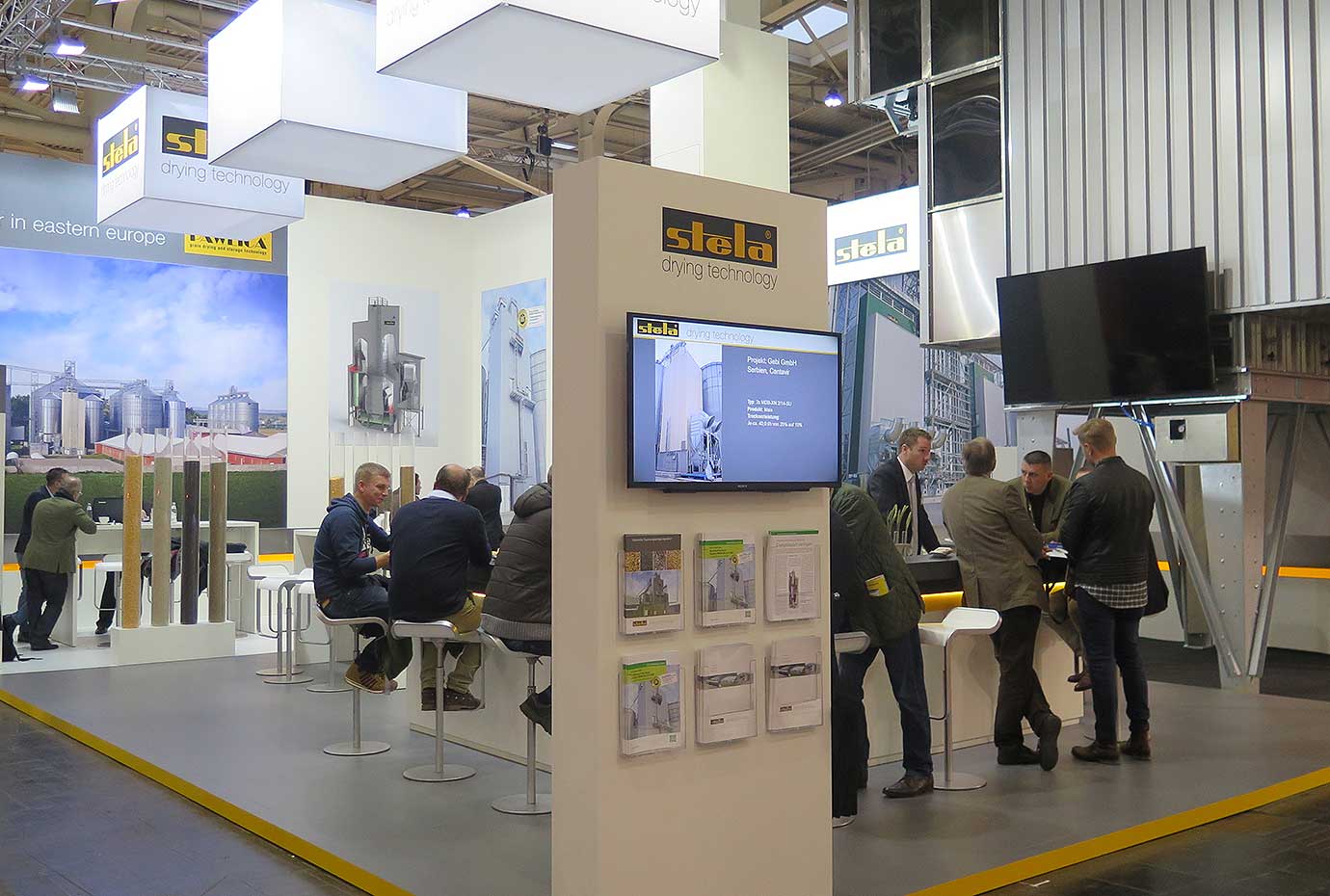Innovations in energy efficiency
2018-04-25
Innovations in energy efficiency
 Over nearly 100 years Stela Laxhuber GmbH has supplied and put over 4000 dryers into service in over 60 countries worldwideAt the Agritechnica 2017 in Hannover, Stela Laxhuber GmbH presented its complete line of dryers for the agriculture industry. STELA produces units for any grain and any size application - whether it be drying wheat, rye, barley, rice, or corn – or oil crops like rapeseed or. sunflower seeds.
Over nearly 100 years Stela Laxhuber GmbH has supplied and put over 4000 dryers into service in over 60 countries worldwideAt the Agritechnica 2017 in Hannover, Stela Laxhuber GmbH presented its complete line of dryers for the agriculture industry. STELA produces units for any grain and any size application - whether it be drying wheat, rye, barley, rice, or corn – or oil crops like rapeseed or. sunflower seeds.
The company’s product portfolio currently includes three lines of drying units: completely mobile MUF batch dryers that don’t require special permits for installation, Universal mobile silo-style dryers, and stationary AgroDry® silo dryers with active heat recovery. All these units were designed by Stela Laxhuber GmbH’s professionals to meet the company’s specifications. The company also produces custom drying units according to customer needs that are tested in the company’s in-house laboratories.
This year at Agritechnica 2017 in Hannover, in the field of stationary drying systems, Stela Laxhuber GmbH presented its patented innovative Biturbo® technology, tried and tested by the German DLG Technology and Farm Inputs Test Centre. The company’s technology helps reduce the hot air needed for drying by 40%, lowering power consumption by 30% compared to standard dryers with heat recovery technology.
Drying in AgroDry® stationary units works on the following principle: grain moves downward inside the unit under the force of gravity. The vertical conduits are intersected by horizontal exhaust and heating ducts. The optimized shape of the drying ducts (with even spacing over their width for even distribution of pressure) ensures even movement of grain, preventing it from “getting stuck” in the column during unloading. Heated air flows from the hot air chamber to the column from the front through horizontal ducts and heats the grain, which warms up and releases moisture into the air and dries. The moist air is then vented by an exhaust fan through exhaust ducts leading out of the unit. The structural design of the ducts ensures optimal, even drying of grain.
Biturbo® technology suctions fresh air into the lower part of the drying unit, where it is heated by a gas line burner and then passes through the lower sections of the dryer with preheated air from the grain cooling zone to the lower drying section. The hot air temperature can be adjusted independently of the upper drying zone, allowing exceptionally gentle drying of grain.
Treated hot air is then blown from the lower drying zone by an axial fan into the upper drying zone where it is remixed with ambient air heated by a second line gas burner. This heated air first flows through the dryer zone where the wet grain is stored, and is then discharged as exhaust air via the upper exhaust fan.
Thanks to the energy efficient system of air ducts, heat losses of around 30% less than conventional consumption in comparable dryers without this specialized heat recovery system can be achieved. For example, to dry 1 tonne of corn from a moisture content of 35% to 15%, you would need up to 1m3/T% of gas.
Besides gas heating, you can use air heating with an oil-fired burner. To achieve a compact construction and, most important, energy efficient operation, Stela Laxhuber GmbH paid particular attention to the location of both direct air heaters in the design and construction of air ducts. Thus, the system provides heat energy for the dryer – to reduce the moisture of 1 tonne of corn from 35% to 15% you use only 21.7 L of diesel fuel.
Compared to conventional dryers, the Stela AgroDry® with Biturbo® heat recovery technology has other advantages such as reducing the volume of hot air used, improved quality of dried grain due to alternative ventilation and various drying temperature setting, less dust due to filtration of exhaust air in the wet product zone, and reduced power consumption.
STELA drying units can run wholly or partially on alternative energy sources – wood, hot water, steam, biogases, straw, wood pellets, lumber, or corn cobs – for environmentally friendly operation.
To offer clients more than just dryers, but also turn-key projects for grain processing and storage, Stela Laxhuber GmbH and Pawlica s.r.o., the Czech engineering company and silo, cleaning machine, and transport equipment producer, joined forced and created Stela Engineering GmbH & Co KG. Since 2013 the company has delivered innovative European and American technologies for drying, cleaning, and storing grain and other products, offering various engineering and process systems, and services for companies to help them store and process grain. The joint company offers process designs that are tailored to client needs, delivers process flow diagrams, pre-design and 3D modelling, consulting on equipment and construction and installation contractor selection, and provides estimates of facility construction costs.
On the practical side, Stela Engineering delivers the entire range of equipment – from grain receiving to laboratory analysis and unloading, construction and installation (using subcontractors), provides process automation, offers staff training, commissions facilities and provides ongoing maintenance services.
At the Stela Engineering booth, we met with Stela Laxhuber GmbH owner and director Tomas Laxhuber, who told us about how the company is directing its attention to the Eastern European grain market: it has a representative office in Kyiv and specialists working on projects in Ukraine, Belarus, and Russia.
Mr. Laxhuber shared the following with us.
How many of your dryers are operating in Ukraine and what share of the market do you plan to win?
— We have already delivered around 35 Stela dryer packages to Ukraine, but our plans are much more ambitious – we plan to bring in another 100, 150, 200 units. In the near future we want to want to build a drying unit here with our innovative Biturbo® technology at a major facility with a significant need for drying. Right now the problem is that such a unit is more expensive than the traditional versions, although the difference in price would be made up in after just a few months of operation.
There are a lot of grain dryer producers at Agritechnica 2017. Is it hard to be competitive? What are your advantages?
— Stela Laxhuber makes only the dryers, and that’s our advantage over most of our competitors. Besides this, we are continuously looking for new designs to make the grain drying process more efficient and cost effective. There’s also the issue of quality: we have been producing grain dryers for 50 years already exclusively from rust- and corrosion-resistant aluminium. Our units do not use any galvanized parts beside the dryer housing, and so they really last several decades.
Can Stela dryers run without interruption for several months when grain is being harvested? How often do they need maintenance? How many maintenance workers are needed?
— Our dryers, particularly our AgroDry line, can run without any downtime for the entire harvest season. Stela Laxhuber also produces drying units for various materials and industries where they run continuously with short service downtime only once per year, so this isn’t a problem for us. As far as how many specialists are required, basically half a person would be enough for maintenance.
Next, we spoke to the founder of Pawlica s.r.o., Petr Pawlica. We asked him how easy it is for companies to operate in Ukraine.
What makes Ukraine unique as an agrarian country?
– Every market is distinct and has certain specific features. The Ukrainian market, for example, is very price sensitive. The basis of the agrarian sector in Ukraine consists of large companies with specific technical specifications for constructing new production facilities and purchasing equipment, and since the investments are quite high, price above all is a big problem. Foreign manufacturers therefore need to know that there is no point in entering the Ukrainian market to make quick money: you need to come here for the longer term, and that requires the right product quality and technology.
What is your overall impression of Agritechnica 2017
— Everything is great! The expo show this year is bigger than before, and the things on exhibit are more interesting. We already have a lot of good contacts and are sure that this expo will be really productive. MARK BJELJAWZEW
MARK BJELJAWZEW